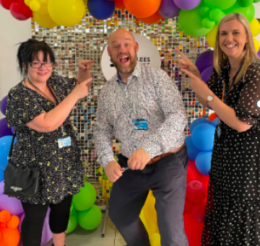Celebrations, reflections and inclusive practices

As we approach the end of the academic year at Kirklees College, we have celebrated with our ‘Festival of Learning’. Each curriculum area came together to showcase the good practice and creative ideas within teaching and learning. What an exceptionally well-co-ordinated event!
This was an excellent way to end the academic year, and as staff take their annual leave and have some well-deserved rest and recuperation, it is a time for reflection. As managers, we are being asked to reflect on our curriculum areas for reporting purposes. We cannot do this without the input of our work colleagues and teams, who are the backbone of all success stories.
I have recently been introduced to the work of Nancy Kline. The Thinking Environment is a philosophy of communication developed by her that enables people to think for themselves and think better together. Here at Kirklees College we have been privileged to work alongside Dr Lou Mycroft in her promotion of Thinking Cultures, which builds on the foundations of the philosophy of Kline.
The thinking spaces are created and facilitated to allow each person to have time to be heard, uninterrupted and without judgement. The space allows people to think as equals as role, rank and ego are left at the door. The latter is a little more difficult to enact!
I had not had this experience before working at the College and found it a little strange initially. Although there is no expectation within the thinking rounds that you would contribute, I felt I should. This attitude to meetings is from a culture of thinking about what we can contribute, grabbing the air space, and not listening to understand, but listening to respond. This is the exact opposite of what thinking environments are for.
I soon learnt it is OK to be silent. These opportunities for listening, really listening to what people have to say are very powerful indeed and I feel this practice should be shared across more organisations. One of the many rewards we have found from this practice is the generation of ideas and solutions that have arisen from our Quality, Performance and Standards meetings, reducing meeting time and giving real focus to the time we have allocated.
As we enter this period of reflection, I encourage more teams to start to use the thinking environments to communicate. Here at the College, we feel a positive shift is occurring and colleagues that had not been heard are now finding their voice. This is creating new cultures within the interactive places and work spaces.
If you would like to learn more about Thinking Environments and how they can work for you and your colleagues, have a look at the AP Guide: Creating Spaces to Think in Further Education and Training (Thinking Environment) | Excellence Gateway It is a good starting point resource.
Karin Sykes, Kirklees College, Higher Education & Skills Manager
